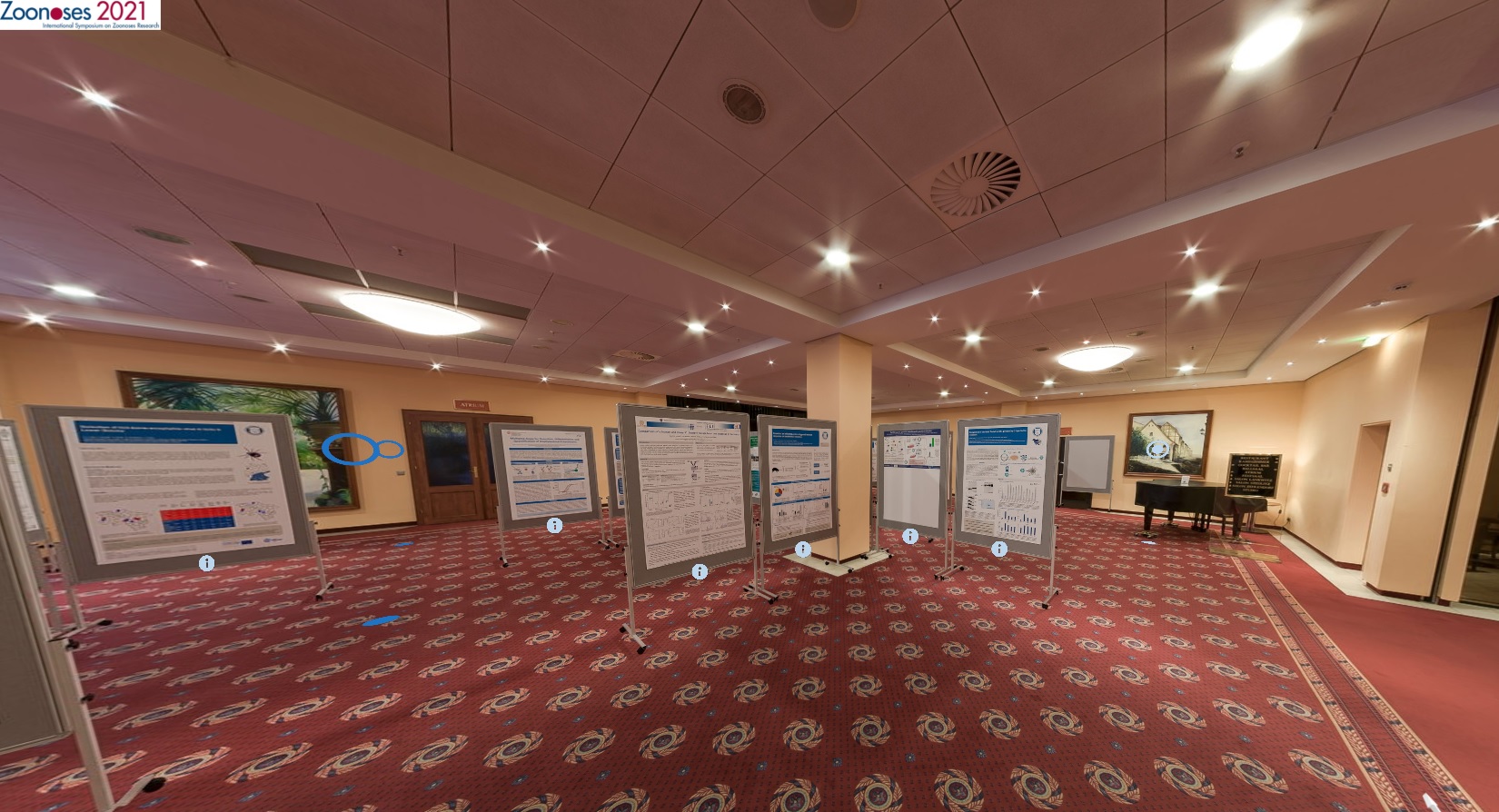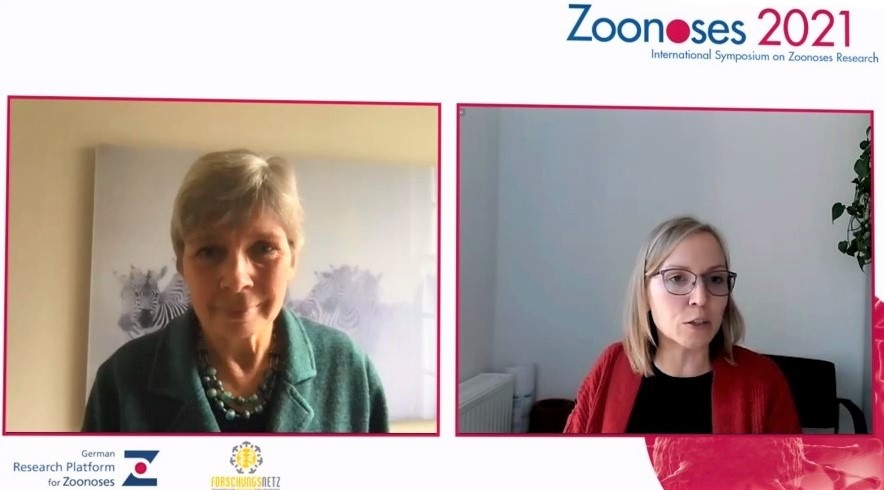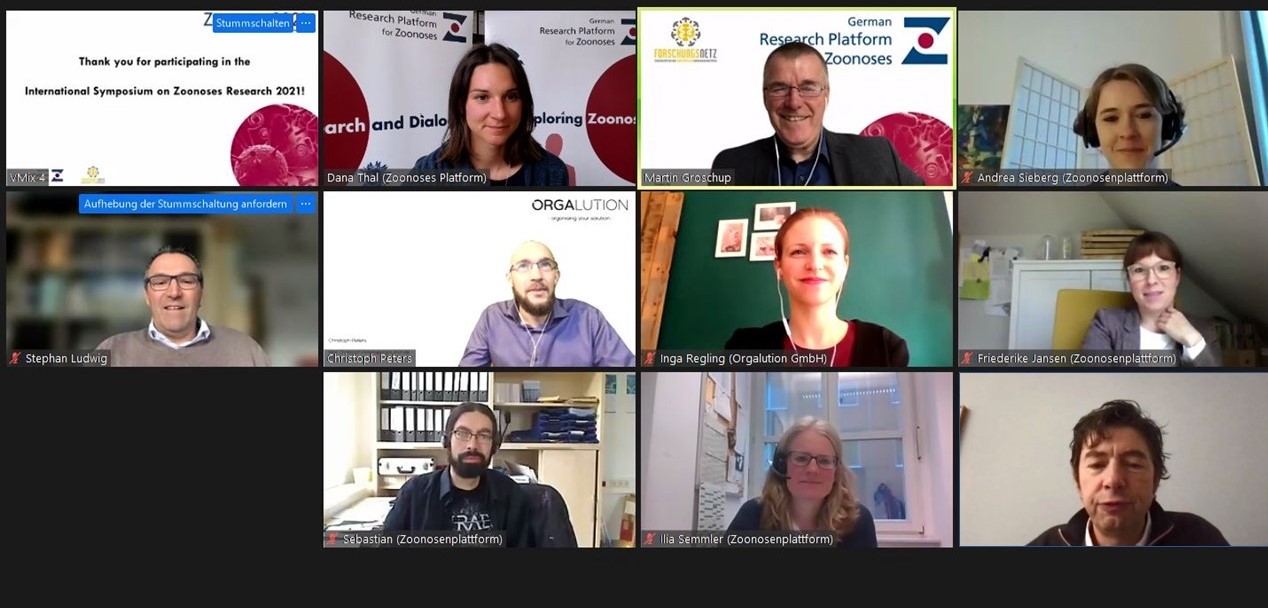The symposium of the German Research Platform for Zoonoses once again brought together hundreds of researchers for an exchange of data and expertise.

Under the title "Zoonoses 2021: From Disease Ecology to SARS-CoV-2", more than 300 zoonoses researchers met online from October 13 to 15, 2021, to share current research results. The wide range of topics reflected the diverse field of research and once again demonstrated the importance of interdisciplinary collaboration to achieve sustainable success in zoonoses research, control and prevention.
It is not without a certain irony that it is a zoonotic pathogen, of all things, that is currently preventing zoonoses researchers in Germany from getting together in person. Fortunately, digitalization offers alternatives and so the big meeting of zoonoses research in Germany could take place online in 2021. The event was opened by Prof. Dr. Martin H. Groschup, head of the Zoonoses Platform at the Greifswald site. He emphasized the power that zoonoses research draws from its interdisciplinarity and the need to expand this even further in the coming years. A statement that was also reflected in the greeting of the ministries, held by Generalstabsarzt Dr. Hotherm, Head of Department at the Federal Ministry of Health (BMG).
Figure 1: Prof. Dr. Martin H. Groschup opened Zoonoses 2021 on behalf of the German Research Platform for Zoonoses, photo: ZOOP
The program of the symposium included keynote lectures, a virtual poster exhibition, a poster slam for young scientists, and various thematic sessions in which new data from zoonoses research were presented in short lectures. In total, nearly 140 researchers presented their work at the symposium. Topics included antimicrobial resistance in domestic pigs as well as the impact of climatic changes on mosquitoes in Nepal. The five keynote lectures once again threw a spotlight on five different current topics of zoonoses research.
 Figure 2: The virtual poster exhibition offered more than 70 researchers the opportunity to present their work and discuss it with colleagues. Photo: ZOOP
Figure 2: The virtual poster exhibition offered more than 70 researchers the opportunity to present their work and discuss it with colleagues. Photo: ZOOP
I. The importance of endemic infectious diseases
Currently, we are witnessing the devastating impact that a pandemic pathogen can have on society. But endemic zoonotic diseases can also be of great importance, as Prof. Dr. Sarah Cleaveland of the University of Glasgow demonstrated based on her research findings from Tanzania. In this context, endemic pathogens often remain below the radar, which can lead to a "cycle of neglect": a lack of data leads to a lack of awareness of the disease, which in turn leads to a lack of investment. which closes the circle. In her presentation, she advocated coupling surveillance for endemic and emerging pathogens to make the best use of capacity. In doing so, she said, collaboration with people on the ground is key to achieving greater equity in global health.

Figure 3: Prof. Sarah Cleaveland (left) in exchange with Dr. Kerstin Fischer (right), who moderated the panel discussion with the speaker, Photo: ZOOP.
II. The link between biodiversity and zoonoses
Another important aspect of zoonoses research was addressed by Dr. Chelsea Wood of the University of Washington. In her work, she deals with the connection between zoonoses and biodiversity. What sounds relatively simple at first glance is not so on closer inspection. This is because biodiversity describes a very complex system for which there is no single measurable variable. In order to be able to approach the question scientifically, Dr. Wood and her colleagues abstracted the parameter "biodiversity" for a global study with different parameters such as urbanization, population density, number of bird and mammal species and forestation. In the end, the scientists concluded that no general statements about all pathogens can be derived from the data [1]. What may seem disappointing at first glance is only logical at second glance. Zoonoses differ not only with regard to the type of their pathogens, but also in terms of transmission routes and host populations. Accordingly, the impact of biodiversity loss on their spread can be diverse. Therefore, individual solutions must be found for individual scenarios. However, it remains indisputable that the destruction of nature and land use changes will have an impact on the occurrence of zoonotic diseases.
III The complexity of zoonotic transmission routes
Another complex area of zoonotic disease research was part of the presentation by Prof. Dr. José de la Fuente of the Instituto de Investigación en Recursos Cinegéticos (IREC): zoonotic transmission pathways. He and his team are conducting research on the role of arthropods as vectors and to what extent the transmission of antigens by ectoparasites can influence immune responses to infectious diseases. In particular, his work focuses on the sugar molecule α-Gal (Galα1-3Galβ1-(3)4GlcNAc-R) [2]. The presentation impressively illustrated how complex the ecology of zoonotic transmission pathways can be and how many different parameters need to be considered, be it only single molecules.
IV. Immunity and vaccine research
Vaccines are an important tool in the fight against zoonotic diseases.Prof. Florian Krammer, an immunologist at the Icahn School of Medicine at Mount Sinai, presented results from his team on immune responses to COVID-19 vaccines. They examined how long the antibodies formed against SARS-CoV-2 remained detectable and the role of non-neutralizing antibodies in the immune response against the pathogen. After this scientific part of his talk, Prof. Krammer used the remaining time to share with his audience an idea for accelerated vaccine development that could help to better prepare for emerging viruses. Such a strategy would involve some costs, but could save follow-up costs of a pandemic. It would be up to society to decide where funds could be most wisely spent, he said.

Figure 4: Prof. Dr. Florian Krammers shared data on the human immune response to SARS-CoV-2 with the participants of Zoonoses 2021, Photo: ZOOP
V. The Silent Pandemic of Antimicrobial Resistance
While the SARS-CoV-2 pandemic has made coronaviruses a major issue in society, the attention currently given to antimicrobial resistance (AMR) is comparatively low. Yet the excessive global use of antibiotics in human and veterinary medicine, as well as in agriculture, may mean that we will soon find ourselves back in pre-antibiotic times, according to Prof. Dr. Lothar Wieler, President of the Robert-Koch-Institute. This man-made problem must now be addressed in global cooperation, he said. As a basis for action, a solid data base is needed on both the incidence of resistance and the use of antibiotics. As with many public health tasks, he said, the time has come for preventive action.
Whether biodiversity loss, AMR or vaccine development, Zoonoses 2021 showed how diverse the challenges for zoonoses research will be in the future. It was all the more gratifying to realize how many valuable research results have already been generated in Germany. The symposium makes us confident that a broadly networked community under the umbrella of the German Research Platform for Zoonoses will be able to address future tasks.

Figure 5: Behind the scenes - the office of the Zoonoses Platform and the staff of Orgalution GmbH, Photo: ZOOP
The office of the German Research Platform for Zoonoses would like to thank all participants in front of and behind the camera!
Text: Dr. Dana A. Thal für die Nationale Forschungsplattform für Zoonosen
Literature:
1. Young, H.S., et al., Conservation, biodiversity and infectious disease: scientific evidence and policy implications. 2017. 372(1722): p. 20160124.
2. de la Fuente, J., et al., The alpha-Gal syndrome: new insights into the tick-host conflict and cooperation. Parasites & Vectors, 2019. 12(1): p. 154.



